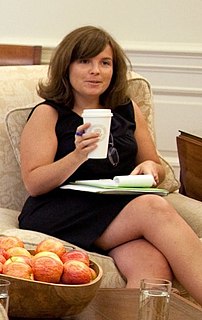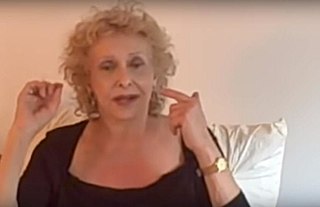A Quote by Kristin Armstrong
Before the Olympics, there's always been a part of me that's wanted to write a book about Women's cycling because there isn't one out there and I think there's a lot to be said.
Related Quotes
I think, for me, there's The Book I Should Write and The Book I Wanted to Write - and they weren't the same book. The Book I Should Write should be realistic, since I studied English Lit. It should be cultural. It should reflect where I am today. The Book I Wanted to Write would probably include flying women, magic, and all of that.
I think that if you look at all of the books that have ever been written about people working in the White House, they're sort of the opposite of my book. And I think that so many people want to write a book that sort of memorializes their place in history. And I wanted to write something for all of the women who are like me. I grew up in upstate New York, I graduated high school with 70 other people and didn't ever know that anything like this would have really been an option for me. So I wanted other young women — and men — to know that just being you is plenty.
I wanted to bring the book out right now because I think anyone who cares about Tibet knew there would be disturbances in the run up to the Olympics [2008]. Many Tibetans feel it's their last chance to broadcast their suffering and frustration and pain to the world before the Olympics take place and China is accepted as a modern nation and the world forgets about Tibet.
One of things I write about a lot is the role of women. An older friend of mine said that she feels like there's always a tension between wanting to be free and wanting to be cherished. I think that's one of the things that my whole book speaks to, wanting to break out of the confines of the roles that are prescribed for women and yet at the same time, not wanting to be totally free. You want to have intimate relationships. It's that bursting out of confinement.
Someone wanted me to write a profile for ESPN about the commissioner of baseball, and I said, "He's just some suit! Some Republican. No!" I mean if you want me to write about baseball, boxing or football, I'll write about those things because I watch them, I think about them a lot and I like them. But I don't want to write about Barry Bonds.
I recorded a lot of songs that I knew I didn't like just because maybe part of me wanted to be nice, maybe part of me just wanted to be in the studio, but I've been learning that it's really important to do what you want to do. Even though I might not write all of it, I am still picking out the songs that I want to do. A lot of people who are writing for me are people I have worked with for a while so they know who I am and what I want. I have a lot of opinions and I have learned that it is absolutely okay to express them and to say, "No, I don't want this."
My teachers always said, "You're very talented, but don't set your heart on art. You're only a girl." I was inspired by Virginia Woolf in 1960, but they wouldn't let me write about her. They said she was a trivializer. I also wanted to do a paper on Simone de Beauvoir, and my philosophy teacher said, "Why would you write about the mistress? Write about the master." That was Sartre.
It was tricky [to write about Israelis], because everyone has an opinion about the Arab - Israeli conflict, and when I first started writing these stories, I was working for an Arab - Israeli human rights group. It was during the Second Intifada. It was this totally violent and intense time, and I think there's a part of me where I don't know how to write about that situation without getting my politics out of my messages, and that's something that was important for me not to do in this book.
I write poetry to figure things out. It's what I use as a navigating tool in my life, so when there's something that I just can't understand, I have to "poem" my way through it. For that reason I write a lot about family, because my family confuses me and I'm always trying to figure them out. I write a lot about love, because love is continually confusing in all of its many glorious aspects.
I'm writing what I want to write. But it's almost an act of rebellion on my part. Because as a person, I've always wanted to be very likeable, and I think that's a horrible thing, particularly for women. You're always like, "Oh, I hope I didn't hurt anyone's feelings. I hope they like me!" And that's just so stupid.
It's tough though because of the whole part about getting sponsors and people out to watch women's cycling. I think the only way that women can really work it is that we have to work our way more into these big grand tours that the men have like the Tour de Georgia, Tour of Utah, and Tour of California.




































